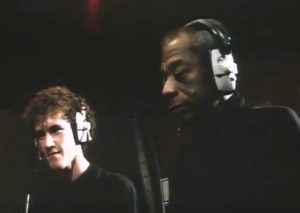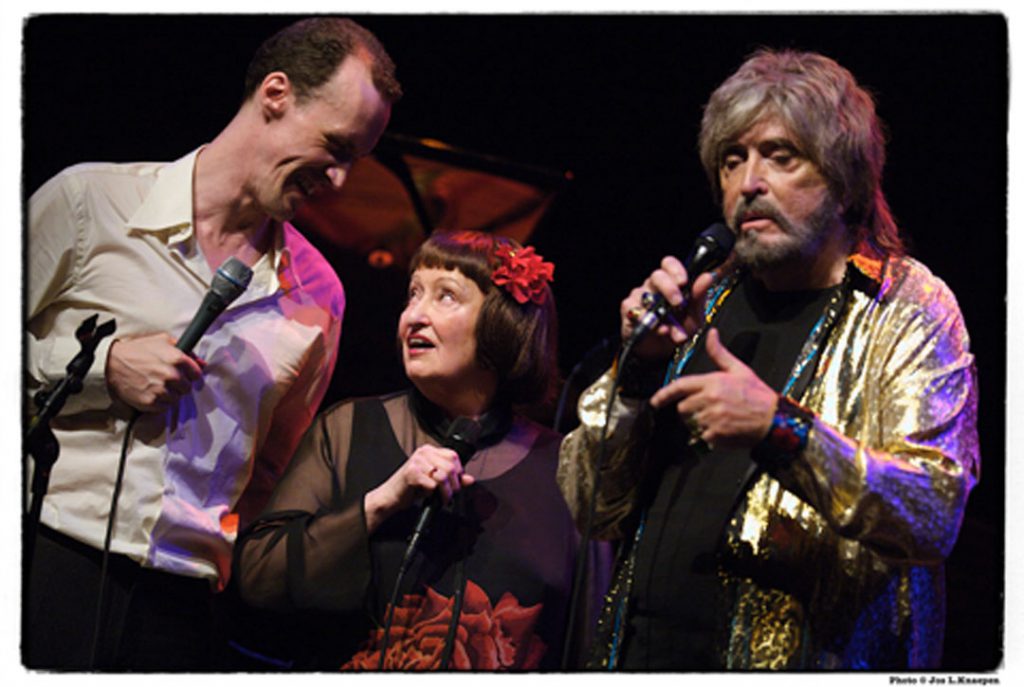David Linx is in no doubt one of the most versatile and creative male vocalists on the Europen, and indeed the world jazz scene. As the son of the composer and musician Elias Gistelinck, Linx inherited a strong musical background. He initially pursued percussion and gained experience as the drummer for American jazz singer Mark Murphy, inspiring him to embark on his own singing career.
Throughout his extensive career, Linx has recorded over 30 solo albums as a leader or co-leader, solidifying his presence in the jazz circuit. He is not only an accomplished performer but also a sought-after educator, imparting his wisdom through masterclasses at prestigious conservatories globally. In 1986, he collaborated on an album featuring American writer and activist James Baldwin that gained him substantial notoriety, some welcome, some less welcome. Linx’s diverse range of collaborations includes working with prominent artists like Toots Thielemans, guitarist Tam De Villiers’ quartet, pianist Ivan Paduart’s quartet (alongside Fay Claassen), and the Brussels Jazz Orchestra.
In addition to his work in the jazz genre, Linx has also ventured into the realm of French chanson. He recorded an album of chansons and engaged in a fruitful collaboration with singer Maurane. Furthermore, he has showcased his talents by composing music for film and dance theater while contributing to the education of aspiring musicians at the conservatory in Brussels. Currently residing in Paris since 1999, Linx’s remarkable career was recognized with the prestigious Prix Bobby Jaspar by the Académie du Jazz in 2005. Recently, I had the opportunity to engage in an in-depth interview with David Linx, delving into his artistic journey and experiences.

David Linx’s deep connection to music was forged within his family’s musical legacy. His father, a trumpet player, played a pivotal role in establishing the renowned Jazz Middelheim festival in 1964, which has since become a prominent event on the European music scene. David’s father served as the backbone of his musical upbringing, providing him with a solid foundation in music. The early exposure to jazz, nurtured by his father, had a profound impact on David, setting him on a path towards a lifelong career in music. David explained, “You know, it was a very heavy music-filled childhood. It wasn’t just the influence of my father; I actually wanted to be a jazz singer from the age of about six or seven. I remember I used to sing along with the albums of Ella Fitzgerald, especially the live ones. I recall when I was about fourteen, she did a concert in Brussels, and I really wanted to meet her. Everyone said, ‘You’re crazy; you’re not going to get to meet her.’ But I went to the concert and managed to get past security, ending up meeting her in her dressing room! That had a huge impact on me.”
Notably, it was Davids father who introduced the legendary Astor Piazzolla to Belgium. David remembers as a child both Piazolla and his then pianist, Argentinian Gustavo Beytelmann staying at the family house. David recalls, “A few years ago, Gustavo called me to sing on one of his albums. I remember that during the sessions, we were talking about Piazzolla, and I asked him if he remembered that first tour in Belgium and staying at the house. He said, ‘Yes, I remember it well.’ I then told him that the little boy who was there at the time was actually me. He couldn’t believe it. It’s funny; we still joke about that when we see each other.”
Another pivotal figure in David’s life was saxophonist Nathan Davis. Davis would often stay at the family house when he was in Belgium. Nathan Davis also holds the role of David’s godfather, and during David’s younger years, Nathan frequently took him on tour. This close relationship with Nathan became instrumental in David’s musical journey, leading to significant encounters with other prominent artists.
Through Nathan Davis, David met drummer Kenny Clarke, with whom he eventually shared a house in Montreuil, just outside of Paris. It was around this time that he had his first encounter with the renowned writer and activist James Baldwin. These connections and experiences with influential musicians and cultural icons played a fundamental role in shaping David’s career and artistic outlook. David’s relationship with James Baldwin played a pivotal role in his life. His first encounter with James Baldwin’s work occurred in his youth when he discovered the Dutch version of “Go Tell It on the Mountain” in his father’s bookcase. Drawn to the book’s glossy cover as a child, it left a lasting impression on him.

David Linx with James Baldwin
In his mid-teens, David began corresponding with James Baldwin, and their connection eventually led to an in-person meeting in Amsterdam during a press conference. James gave David his phone number in the South of France, and a year later, David called and said, “Hey, I’m coming down.” Surprisingly, James welcomed him with open arms. David shared, “It was crazy; he must have forgotten who I was! Anyway, I arrived with two suitcases and basically never really left. During this time, I spent half my time in the apartment in Paris with Kenny Clarke and the rest with James in the South of France.” Later on, he also traveled to the United States, where he continued to spend time with James Baldwin and his family.
In 1986, David recorded an album featuring a multinational lineup that included Pierre Van Dormael and Slide Hampton, with poetry written and read by James Baldwin. The album garnered significant attention in both Europe and the United States.
David’s life was quite dynamic during that period, and he found himself in various places. He also spent his vacations in Laaren with Jerry van Rooijen, coinciding with Ella Fitzgerald’s stay in the city. It was during this time that his path crossed with Mark Murphy. David reflected on how Mark Murphy profoundly influenced him, saying, “Mark Murphy really had a major impact on me. Back in that time, most male singers were crooners, but Mark was a real jazz singer. After working with him for a while, playing drums, I knew I really wanted to be a singer, and that’s when I decided to concentrate on singing.”
This pivotal encounter with Mark Murphy marked a turning point in David’s life, leading him to embrace a career in singing, inspired by Mark’s unique style as a jazz vocalist.
David’s journey in the jazz world wasn’t without its challenges. He faced hurdles as a white male jazz singer in a European scene predominantly populated by female vocalists, especially those performing American standards. He expressed, “I felt like I had everything against me, I was a white European jazz vocalist, not doing standard repertoire. You could sing your ass off, but at that time, you were invisible!”
He further elaborated on his approach, emphasizing the importance of departing from the traditional path: “It’s not about the tradition; don’t get me wrong, I know the tradition. In fact, you can’t play my compositions if you don’t know the tradition. But I don’t want my musicians to play the tradition when they perform my compositions. I just want to feel it and know it’s there, but I don’t want to hear it.” It took David at least a decade to establish his own distinctive presence in the European jazz landscape, as he explained, “It took at least that long to create a reference for people to say, ‘Oh, okay, David Linx, European jazz!’ Because it really didn’t exist before that. You can’t imagine the kind of backlash I had during those ten years, and sometimes I still encounter it to this day.” Despite the initial resistance, his determination to be original in his music and lyrics eventually led to his success, and he continued to be a nonconformist throughout his career, stating, “I’ve always felt I wanted to go against the grain and sing my own compositions, write my own lyrics, and basically do my own thing. I felt I had to be original from day one.”

David Linx | Sheila Jordan | Mark Murphy
Photo by Jos Knaepen
When delving into David’s approach to composition, particularly his vision toward writing lyrics, he revealed his deep passion for the art, describing it as “almost hypnotic.” However, he also stressed the importance of understanding the roots of music and the tradition it stems from. He shared an example from his teaching experience, where students might express a lack of connection with a standard tune. To this, he responded, “I’m not telling you to put it in your setlist; you just have to learn and understand it.” David firmly asserted, “Songwriting is a craft, and a lyric is a lyric; it’s not an excuse to just sing a melody. It has to mean something. Remember, a composition only becomes a song when it has lyrics.”
For David, songwriting is not just a creative outlet but a means of conveying a message. He has had several of his compositions recorded by other artists, and his work, which includes having four compositions featured in the “New Real Book,” has earned him recognition as a composer. Reflecting on this, he remarked, “It’s really crazy to have American singers record your songs. It’s like a major turnaround from the way it was. It’s weird, in a way, to see your composition start to live its own life and almost become a standard.”
According to David, the “Skin in the Game” album represented his pursuit of independence and a break from the industry’s conventional expectations. He aimed to break free from the established norms, as he explained, “It’s an independence thing. With that album, I wanted to break loose from what the industry has been pushing. I wanted to break out of the form.”
He also acknowledged that this album stood out from his previous work, particularly in terms of energy and the choice of musicians involved. David highlighted, “It was mainly different as far as the energy goes… It was a lot about the musicians I used. They were all young and brought a different vision to the project.” When selecting musicians for recording, David emphasized that he considers their unique qualities and actually writes the material with them in mind.
Regarding the material on the album, David aimed to challenge the Status Quo as well as standard jazz harmonic and melodic structures and break away from traditional expectations of a jazz vocalist. He encouraged his students not to conform to preconceived notions of what a jazz vocalist should be. He even recounted an encounter with a fan who questioned the album cover’s design and jazz authenticity.
David considered the album a political statement, though it wasn’t his initial intention. He expressed his disillusionment with attempting to please an unpleasable entity and, in response, decided not to conform to expectations. This creative liberation was a defining aspect of the album’s journey.
After the release of “Skin in the Game” in 2020, David embarked on a creative journey that led to the production of several albums, each distinct from the previous. In 2021, he introduced “Be my Guest,” followed by a collaboration with Fay Claassen and the WDR Big Band later the same year. These projects showcased David’s versatility and his willingness to explore various musical avenues.
Additionally, he ventured into a unique project titled “On Shoulders We Stand,” released on Enja Records. This album featured David writing English lyrics to classical piano melodies. Its success was evident as it received recognition with a nomination for an Edison Award in the Netherlands, underlining the innovative approach that David had taken. Looking ahead, David is now in the process of preparing several new projects, demonstrating his continued dedication to expanding his creative horizons.

On Shoulders We Stand Matteo Pastorino | David Linx | Guillaume de Chassy
David shared some insights into his upcoming projects, including one with Gustavo Beytelmann, originally intended to be a Latin album with contributions from Paolo Fresu. However, this project had to be postponed due to Gustavo’s illness. David expressed his enthusiasm for the album, saying, “With that album on hold, I started to work on the follow-up to Skin in the Game. I’ve actually written 26 songs for that over the last few years, so I’m extremely excited about it.”
During his preparation for the new album, David had the opportunity to rehearse with a talented new trumpet player, Hermon Mehari. He expressed high praise for Mehari, exclaiming, “You’ve got to check him out, he’s amazing.” The upcoming album will also feature the same rhythm section as his previous release.
As the conversation turned towards the music industry’s current state, David and I delved into a passionate discussion. When asked if he saw himself as a disruptor in the industry, David responded, “Well, I don’t know if they see me as a disrupter; I really don’t know how they see me. What I can say is that I’m a white European male jazz singer on the periphery, and that gives me the prerogative to claim the center! I needed to do that in order to exist and be heard.” David continued to elaborate on the challenges European male vocalists face in gaining international recognition in a business still he
Last modified: May 30, 2024















